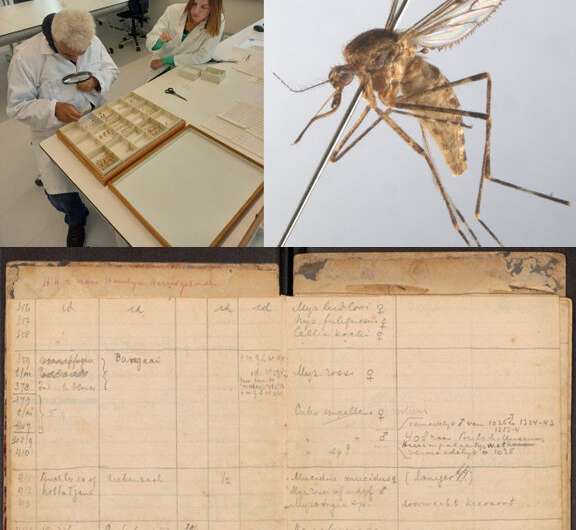Field records of an early-20th century female public health pioneer converted to 21st century data

Natural history collections contain huge amounts of information on diversity, distribution and ecology of a variety of species; however, much of this valuable information is effectively lost to researchers due to historical and practical constraints: most of these data are only available on non-digitized labels and in journal notes.
The absence of such extensive data is particularly unfortunate because some of those records include information on vector-borne disease species, including a variety of mosquito species, which are responsible for more than 17% of infectious diseases worldwide. Moreover, as climate change alters temperatures and weather patterns around the world, invasive species are spreading into new areas, with the expectation that the risk of vector-borne diseases will further increase.
It is estimated that by 2050, disease-carrying mosquitoes will ultimately reach 500 million more people than they do today. To address this critical data loss, a team of researchers at the Naturalis Biodiversity Center have painstakingly organized and digitized information from the handwritten notebooks of the Dutch entomologist Johanna Bonne-Wepster (1892-1978), unlocking formerly inaccessible information and making it readily available to researchers and citizen scientists worldwide.
The article is published in the journal GigaByte.
Bonne-Wepster played a particularly important role in Dutch tropical medicine. Her career spanned from 1917 to 1961, during which time she and her husband carried out research in the former Dutch colonies of Indonesia and Suriname. Bonne-Wepster, one of many historical, non-formally trained women who, like these data, are lost to history, collected tens of thousands of mosquitoes, and trained herself to identify their species.
Her thorough investigations, which provide detailed physical descriptions of this blood-sucking family of insects, was aimed at giving non-taxonomists the means to recognize different vector species.
Bibiche Berkholst from Naturalis comments on the collection: “Bonne-Wepster collected and documented a huge amount of mosquitoes in her lifetime. We were able to digitize over 10,000 of those, which took us many months. Each mosquito had to be checked against the Bonne-Wepster’s field books, and many specimens were missing locality and/or species labels, which needed to be added as well.”
“It feels very satisfying that this important collection has been digitized, and I hope that the remarkable history of Bonne-Wepster will inspire many female amateur entomologists like myself.”
During the twenties and thirties Bonne-Wepster collected the bulk of her legacy collections. After her return to The Netherlands in 1948, Bonne-Wepster continued researching mosquitoes primarily at the University of Amsterdam. Even though she was not academically trained, her enormous contribution to the field of mosquito taxonomy ultimately did not go unnoticed as she was given an honorary doctorate from that university in 1951.
In the 1970s, her collection was transferred to Rijksmuseum van Natuurlijke Historie (RMNH) in Leiden, now known as Naturalis. Initially, the museum obtained only the sampled specimens, not the field books with elaborate fieldnotes. The field books were thought to have been lost until a curator of the RMNH made a visit to the elderly Mrs. Bonne-Wepster and was able to retrieve them.
Efforts are being taken to digitize these original field books, mobilizing data contained in them, and corroborating this with the associated specimens. For the first time, these archival texts and 52,102 of her records of mosquitoes are being released into the public domain via the Naturalis and GBIF (Global Biodiversity Information Facility) repositories, making them fully available to both researchers and citizen scientists worldwide.
In addition to previously inaccessible Bonne-Wepster data, the researchers have also digitized detailed information from the smaller amounts of data from collections available at the Zoölogisch Museum Amsterdam Nederland (1,216 mosquitoes) and the former RMNH (another 2,388 mosquitoes).
The data made available through this project is particularly valuable because it describes historical and recent records of mosquitoes, and can be used in different areas of research, including estimates of spatial distribution, modeling of current and future distributions through Ecological Niche Modeling, and for developing much-needed vector control programs.
It further highlights the importance of finding, digitally extracting, and organizing data from the vast number of unavailable and extremely valuable historical documents so they can add to the currently available information, form historic baselines, and substantially extend the study of trends in the spread of vectors of human and animal disease. This type of work can have a huge impact on current public health issues as well as be of historical interest.
First author Pasquale Ciliberti says of the data: “I would really like it if the data we unlocked could contribute, even in a minimal form, to the understanding of the ecology of mosquitoes. To me, as a collection manager, it would have been a nightmare if the information stored in the field books would have been lost. I am very glad that this information is online and available to researchers. Also I am pleased that we are valuing the work of a woman in Science. She was officially an ‘amateur’. She shows that with passion and commitment you can achieve a lot.”
More information:
Pasquale Ciliberti et al, Digitizing the Culicidae collection of Naturalis Biodiversity Center, with a special focus on the former Bonne-Wepster subcollection, Gigabyte (2023). DOI: 10.46471/gigabyte.85
Citation:
Field records of an early-20th century female public health pioneer converted to 21st century data (2023, July 18)
retrieved 19 July 2023
from https://phys.org/news/2023-07-field-early-20th-century-female-health.html
This document is subject to copyright. Apart from any fair dealing for the purpose of private study or research, no
part may be reproduced without the written permission. The content is provided for information purposes only.
For all the latest Science News Click Here
For the latest news and updates, follow us on Google News.

